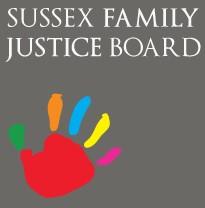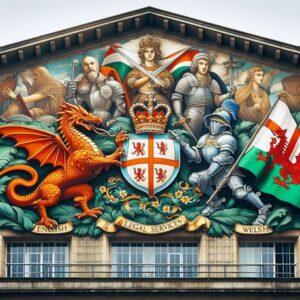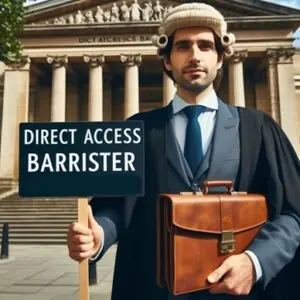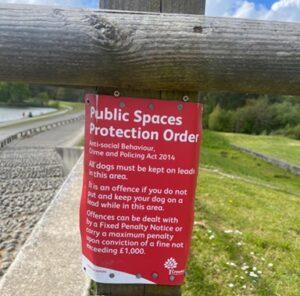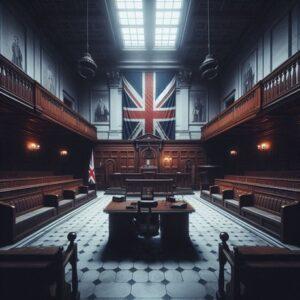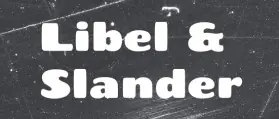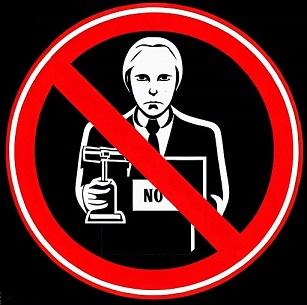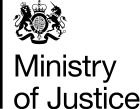- Is the Sussex Family Justice Board membership biased in favour of the 1 Crown Office Row barristers chambers based in Brighton Sussex ?
- How are Judicial Observers selected as this appears unduly biased towards members of the Brighton judiciary ?
- Why were these judges listed as board members as this is clearly incompatible with the independent position of the judiciary ?
- Mr Justice Williams – Family Division Liaison Judge for the South Eastern Circuit (Kent, Surrey, Sussex & Thames Valley)
- HHJ Bedford – Designated Family Judge for Sussex
- HHJ Farquhar – Lead Judge of the Kent, Surrey & Sussex Financial Remedies Court (FRC)
- HHJ Lusty – Family Judge
- DJ Pollard – Family Judge
- Who are the Sussex Family Justice Board accountable to ?
- A treasurer is listed as a board member. Where does the money come from and where are the accounts ?
- Does the Sussex Family Justice Board website comply with UK law ?
- What is the Cafcass involvement with the Sussex Family Justice Board ?
- Is “Justice” being done in secret by the Sussex Family Justice Board ?
- Are there any grounds for suspicion that there has been an improper interference with the course of justice by the Sussex Family Justice Board ? R v Sussex Justices, Ex parte McCarthy [1924] 1 KB 256
There are significant concerns of bias, secrecy and judicial independence, which relate to the operation of the Sussex Family Justice Board.
Update 21st March 2023 : Sir Andrew McFarlane who is the President of the Family Division pfd.office@judiciary.uk has been contacted for his response.
Update 3rd April 2023 : HHJ Farquhar denies he has ever been a member of the Sussex Family Justice Board despite clear evidence that shows he has been a member of the SFJB for at least 5 years.
Update 24th April 2023 : HHJ Farquhar, HHJ Lusty and DJ Pollard have mysteriously vanished from the list of board members published on the Sussex Family Justice Board website.
A large number of pages and links have also been removed from the SFJB website. This is believed to have happened on the 18th April 2023 at 20:37.
Is this a cynical attempt at a cover up ? Who removed them and why ?
SFJB-List-of-Members.docx dated September 2018 was found in the Google cache and clearly shows that HHJ Bedford, HHJ Farquhar and DJ Pollard were board members.
Update 9th June 2023 – FOI request sent to Ministry of Justice
Update 18th June 2023 – All Sussex Judges and One High Court Judge have now vanished from the SFJB website.
Update 3rd July 2023 – Complaint filed.
Update 4th July 2023 – Ministry of Justice response to FOI request about Sussex Family Justice Board
230609011 – FReedom of Information Request (FOI) Ministry of Justice
- The MoJ is not responsible for the Sussex Family Justice Board.
- The MoJ does not fund the Sussex Family Justice Board.
- The MoJ does not audit the Sussex Family Justice Board.
- The MoJ does not have a Terms of Reference document for the Sussex Family
Justice Board.- The MoJ are not the correct authority to ask about this matter. Anything published regarding local roles, responsibilities and processes are locally determined and published by the relevant Local Family Justice Board(s). You may wish to contact Sussex Family Justice Board. Information on how to contact them can be found at: https://www.sussexfamilyjusticeboard.org.uk/
- To advise and assist you, please note that Local Family Justice Boards are not public authorities under the Freedom of Information Act (FOIA). They are not named
in schedule 1 of FOIA or in an order of the Secretary of State, and are not a wholly owned company, so do not meet the definition under section 3 of FOIA and thus are not subject to Freedom of Information Requests.
Update 7th August 2023 – The Sussex Family Justice Board website is now in maintenance mode (since 27th July 2023). Has the family justice cartel in Sussex finally been shut down for good ??
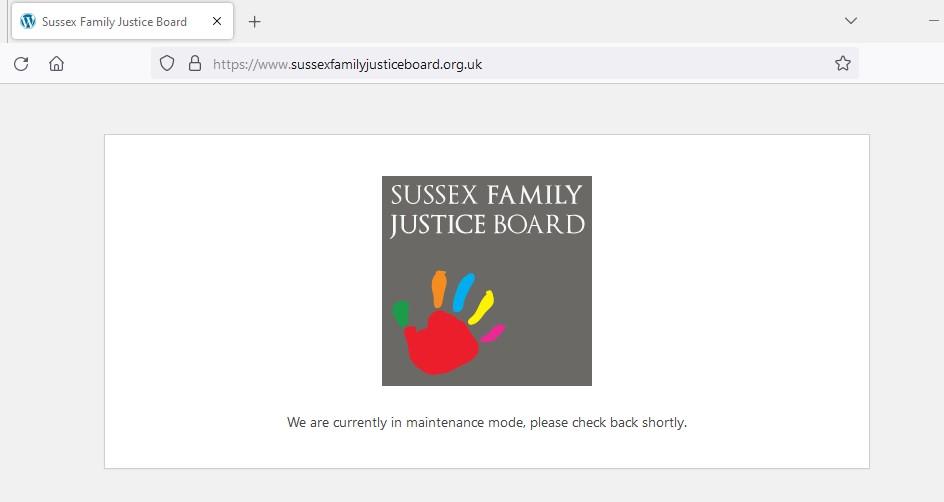

Update 14th August 2023 – The Sussex Family Justice Board website is now partially back up as of 14th August 12:26. There are now 11 pages in total according to the SFJB XML Sitemap. Notably a Privacy policy is still missing !
*PLEASE NOTE THIS WEBSITE IS CURRENTLY UNDERGOING IMPORTANT UPDATES*
The Sussex Family Justice Board is a subsidiary of the National Family Justice Board and works collaboratively to improve the performance and efficiency of the local family justice system.
Please note that this website is up to date as at June 2023; it will be reviewed periodically by members of the Sussex Family Justice Board but we cannot guarantee that it is up-to-date at the time of reading.
Sussex Family Justice Board 14th August 2023
Four Sussex judges are now listed as observers and the board has a number of new members including 1-6 Crown Office Row ! Is HHJ Farquhar aware that he is now an observer ?
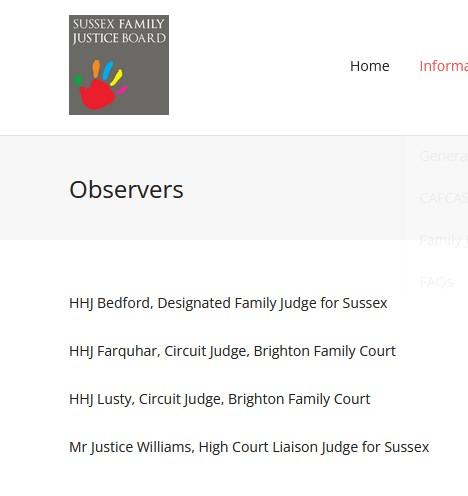
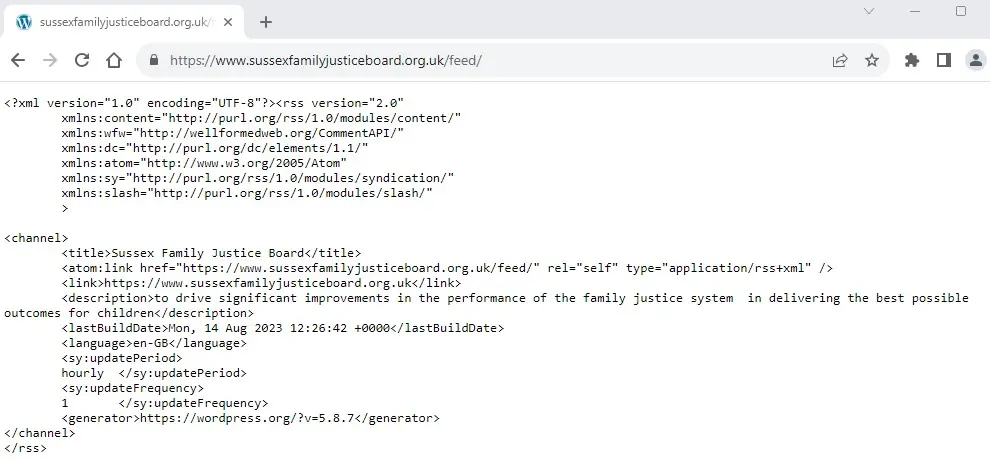
The National sponsor of the SFJB is listed as Tom Glynn Policy Unit Ministry of Justice. What is the real involvement of the MoJ in the SFJB ?
Fortunately, a copy of the Sussex Family Justice Board website was legally taken on the 19th March 2023 using HTTrack software and is safely and securely stored by the MOI as evidence.
A Google Search on the 3rd April 2023 returned the following :-

A Bing Search on the 3rd April 2023 returned the following :-

The Sussex Family Justice Board website showed :-
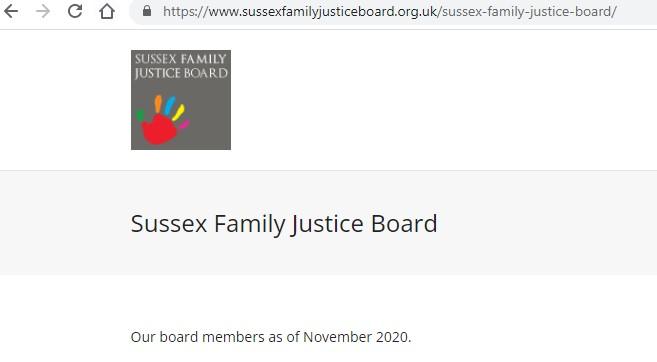
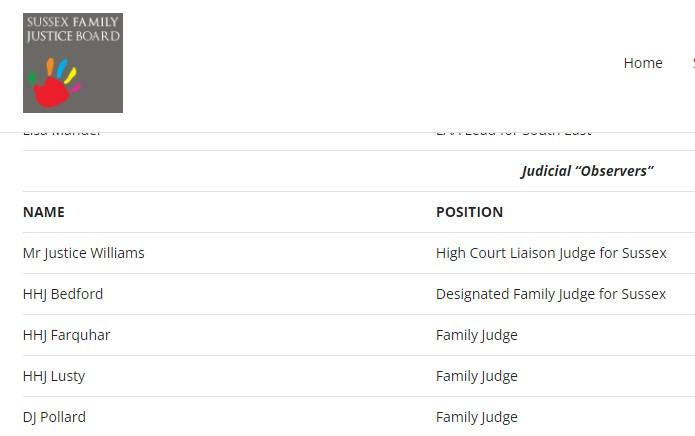
The Sussex Family Justice Board website, according to their public RSS Feed, was updated on the 18th April 2023 at 20:37.
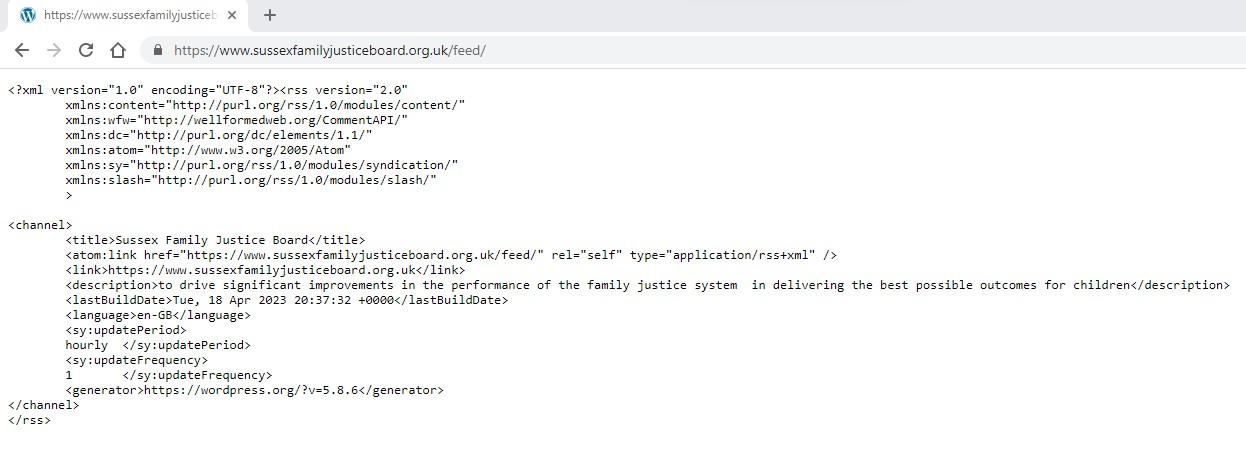
HHJ Farquhar, HHJ Lusty and DJ Pollard have mysteriously been removed as board members.

The Sussex Family Justice Board website, according to their public RSS Feed, was yet again updated on the 18th June 2023 at 18:16:58. No judges are now listed as board members. It is assumed that all judges were removed as board members on this date.
Is this another cynical attempt at a cover up ? Who removed them and why ?
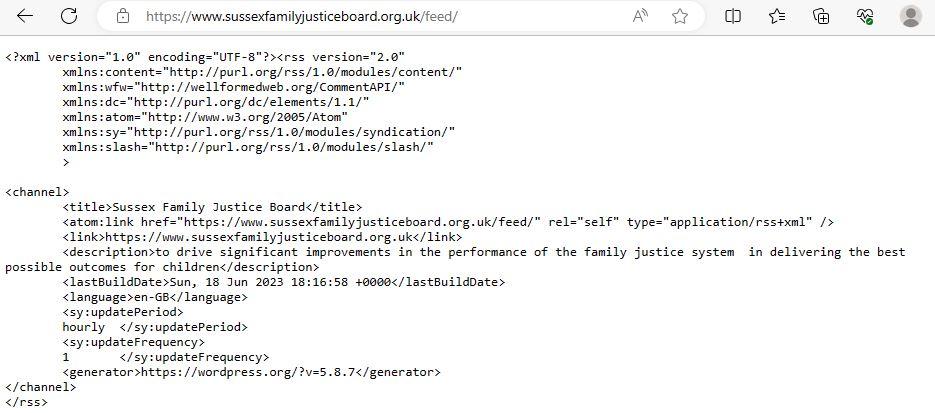
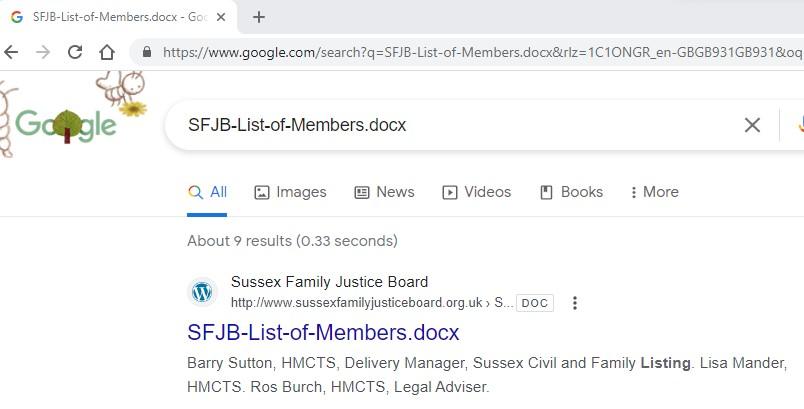
The open justice principle “that justice must be seen to be done as well as done” is a fundamental principle of the UK legal system.
“…there is a significant and important public interest in our society having and maintaining confidence in the work of the Family Court. Conversely, a largely closed system, where the public are given no account of how the court operates, leads to accusations that this is ‘secret’ justice and that the approach of the court is unsound, unfair or downright wrong….”
Sir Andrew McFarlane – President of the Family Division in his document Confidence and Confidentiality: Transparency in the Family Courts published 28th October 2021
The Guide to Judicial Conduct – Revised March 2018 (Updated September 2020) is clear about bias, in particular :-
“They should also bear in mind that too close a social relationship with a practitioner who is regularly involved in litigation before the officeholder’s court may create a perception of bias.”
Contact with the Legal Profession – The Guide to Judicial Conduct
It is extremely perverse and worrying that a board that supposedly promotes justice has a website that does not comply with UK law.
Multiple requests for information using the Sussex Family Justice Board Contact Us page have not resulted in any response.
A Freedom of Information (FOI) Request Information about the Sussex Family Justice Board (LFJB) was therefore made on the 17th March 2023 on WhatDoTheyKnow ?
Dear Sussex Local Family Justice Board,
Do you have a Terms of Reference document for the Sussex Family Justice Board similar to the Family Justice Board?
Do you publish minutes and if so where ?
How are members of the Sussex Family Justice Board selected or elected ?
How does the Sussex Family Justice Board ensure there is no bias in the selection or election of board members ?
Do you have an updated members list as the list published and dated November 2020 appears out of date ?
Do 1 Crown Office Row (1COR) still sponsor the Sussex Family Justice Board website ?
1COR sponsor Sussex Family Justice Board
Who is legally responsible for the Sussex Family Justice Board website as this does appear to comply with UK law ?
How are the Judicial Observers selected as this appears biased towards the Brighton judiciary ?
How is the Sussex Family Justice Board funded ?
Do the Sussex Family Justice Board publish accounts and if so where ?
Are roles and responsibilities of the board and other policy documents published and if so where ?
Is the Sussex Family Justice Board audited by the Ministry of Justice or any other government or independent bodies ?
Please provide all relevant documents.
Yours faithfully,
Rev Dominic Watts
Ministry of Injustice
Information about the Sussex Family Justice Board (LFJB)
https://ministryofinjustice.co.uk
The Family Justice Board is the primary forum for setting direction for the family justice system and overseeing performance.
“The judge is not a member of the board as to be so would be incompatible with the independent position of the judiciary.”
Judiciary and the local justice system
Check out our articles on Sussex Police, HHJ Farquhar, HHJ Bedford and Fraud in the Justice System.
Read the reviews of Gavin Howe Barrister
“He is awful, underhanded and should not be practising law!”
“Family justice boards” and the like everywhere now panicking as they finally realise what happens on the internet stays on the internet forever!
Twitter
Latest Articles
- What is the Legal Services Board ?The Legal Services Board (LSB) is an independent regulatory body that oversees the legal services sector in England and Wales.… Read more: What is the Legal Services Board ?
- Direct Access BarristerA Direct Access Barrister, also known as a Public Access Barrister, enables members of the public to directly instruct a… Read more: Direct Access Barrister
- What is a Public Spaces Protection Order (PSPO)?A Public Spaces Protection Order (PSPO) is a powerful tool introduced in 2014 under the Anti-Social Behaviour, Crime and Policing… Read more: What is a Public Spaces Protection Order (PSPO)?
- Transparency and Open Justice BoardThe Lady Chief Justice of England and Wales, Dame Sue Carr, has created a new Transparency and Open Justice Board.… Read more: Transparency and Open Justice Board
